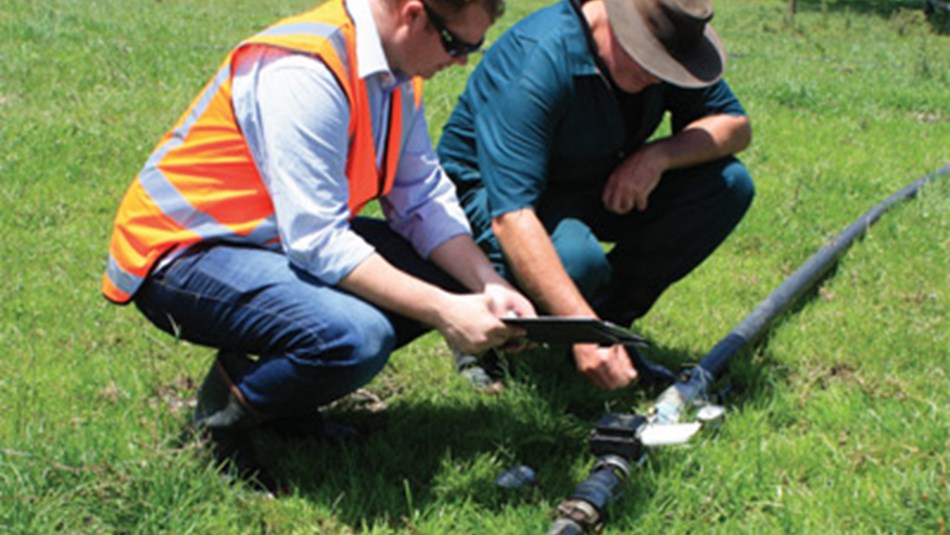Assessor input helps develop effluent solution
NZ Dairy Farmer March 2018 Edition
Farm effluent systems can offer a package of headaches for dairy farmers. Their high installation cost, challenges to operate in an environmentally sensitive manner, and the ever present risk of compliance failure all mean they can be a complex part of the dairy farm operation.
Several years ago DairyNZ developed the Effluent Warrant of Fitness programme for dairy farmers to help address those challenges.
The “Effluent WoF” provides a standardised, independent means of assessing every aspect of a farm’s effluent system constructively, with accredited assessors providing farmers and prospective buyers with a clear outline of the farm system effectiveness, including all its areas of weaknesses and areas of strength.
The programme has gained momentum, and now managed through QCONZ has a network of skilled rural professionals around the country certified to assess and compile farm Effluent WoFs.
Their work is providing farmers across the country with reports that offer peace of mind for those with compliant and efficient systems, and some positive options for those whose systems need to be upgraded, expanded or improved.
Reporoa farmers Murray and Michelle Knight moved to their 124ha property four years ago, inheriting the farm’s old two-pond effluent system that was rapidly approaching the end of its useful life.
“We also had a number of areas around the farm we could have committed funds to.
“However our supply company Miraka offers a premium on its payout if you are part of its quality assurance programme. To be part of that we had to be able to guarantee our effluent pond did not leak, so that became the first priority for our upgrade.”
Murray was also conscious he needed a non-leaking effluent pond, given the farm’s light pumice soil and its stone’s throw proximity to the Waikato River.
He engaged the services of a certified Effluent WoF assessor to help develop a system that would tick the boxes for Miraka, and for his farm’s sustainable future.
“We had a limited footprint area to work with for a new system, and I wanted not only a compliant system, but one that was easy to use, with minimal components to it that delivered effluent in a manner that was suited to our farm’s hilly contour,” says Murray.
The installation of a feed-pad had to also be incorporated into the assessment, with its additional catchment area and frequent use over periods of high supplementation.
After the assessment was complete they arrived at a system with a 500,000 litre concrete storage pond at its centre. This offers 28 days storage and Murray pumps directly from this into a tractor towed slurry tank for paddock application.
“We opted for the concrete option which was not significantly more than a lined pond, and gave me peace of mind that it would not degrade over time, or rip from the stirrer. It can also be drained completely and then you can use a digger to scrape it out.”
The slurry tanker means Murray can cover 100% of the farm, in contrast to the limitations an irrigator sprinkler brings on area. As a result, he can spread the effluent thinner, to about 5mm, reducing run off risk, and optimising its availability for plant uptake.
“It also means if we want to focus on some poorer paddocks, or on some cropping paddocks, we can adjust the amount accordingly.”
With his long time farm assistant stepping up to a management role, it means Murray is happy to commit the time to spreading using the tractor, knowing application is timely, compliant and effective.
The warrant of fitness assessor has recently returned to Murray’s farm to re-assess the system, and had found the application rate he has been working on was calibrated to be spot on.
As time goes on, dairy effluent assessors are finding farmers like Murray the norm in terms of their desire to comply, but also to have a sustainable, environmentally suitable system on farm.
More farmers are recognising the nutrient benefits that can come from having a compliant, suited system. The ability to reduce fertiliser inputs and save makes the assessment cost good value for money.
With a couple of seasons behind him using the system Murray has found the system as simple as he had hoped, and he appreciates regular assessments as a means of providing independent, calibrated feedback on whether his application system remains on track.
“I think we are going to find that there will be greater need to spread effluent further than many systems do now.
“I have peace of mind at night knowing we have arrived at something that is compliant, sustainable, and is helping us earn a premium for our milk supply.”
Book a WOF with a certified effluent assessor

